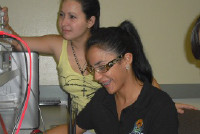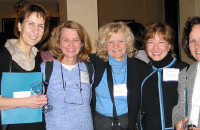Highlight on DREU Alum, Katie Wolf
Originally printed in Summer/Fall 2011 Newsletter.
KatieAnna Wolf is a first year Ph.D. student and NSF Graduate Research Fellow at Princeton University researching in the SoundLab under Assistant Professor Rebecca Fiebrink. She received joint bachelor’s degrees at the University of Minnesota in math and computer science (2011), was a CRA Outstanding Undergraduate Researcher Award finalist (2010) and spent two summers participating in the CRA-W/CDC Distributed Research Experience for Undergraduates (DREU) program (2009, 2010). Over the last three years Katie has attended the Grace Hopper Conference, where in 2010 she presented during the CRA-W Career Mentoring Workshop: “What is Research?” directed towards undergraduate students. She plans to develop her research and Ph.D. thesis in the area of computer music.
Q: How did you become interested in pursuing a career in computer science?
As an undergraduate, I had a strong interest in math and decided to take a course in computer science my second semester. It was there that I got to really see how rewarding it was to use my problem solving skills while working with other students and technology. I had many different interests when I was younger, but I found that computer science really challenged me on a different level and gave me a greater sense of satisfaction and accomplishment. The interdisciplinary opportunities with computer science were also something that attracted me a lot, as I have many outside interests that are fun to learn about while doing the problem solving that I love.
Q: How did your experience with DREU influence your career path?
The DREU program has been one of the largest influences in the development of my career. My DREU experience at Oregon State University in the summer of 2009 was my very first research experience, which introduced me to what research was about. Prior to this, I had been an intern at a global manufacturing company (in the summer of 2008, after my sophomore year) and continued there part time, 20 hours a week, during my third year as an undergraduate. After the DREU summer, I continued at my internship part time during the next fall. At the same time I applied for UROP (undergraduate research opportunity program) at the University of Minnesota for the next spring, and was accepted. I then had to choose between continuing with the internship or doing research, as it was clear that I could not do both. While I really enjoyed the internship and the benefits that came with it, doing research was something that I was a lot more passionate about.
I was fortunate to have been selected to participate in DREU for two summers, the second of which was in 2010 at the University of Southern California. I continued that research throughout the fall of 2010 at the University of Minnesota for my undergraduate honor’s thesis. I was also able to develop my research and present it at the International Society of Music Information Retrieval Conference (ISMIR) in the Netherlands. It was at that conference that I first met my Ph.D. advisor, and where I really decided the research area that I wanted to go into. I was able to use all that I had learned and researched in my second DREU experience as a basis for my research proposal in my NSF Graduate Research Fellowship application, which was successfully accepted. So not only did DREU give me my first research experience, but it led me down the path I am on to get my Ph.D. at Princeton as an NSF Graduate Research Fellow.
Q: What made you decide on computer music as your research area?
I played flute for 7 years when I was younger, but as an undergraduate in the college of science and engineering. I found that I was unable to keep up with my music skills in addition to my other responsibilities. During my second DREU experience working with Elaine Chew at USC I was first introduced to the research area that combined music and computing, and attending the ISMIR conference opened my eyes to the numerous ways that these two fields can be combined with research. Being able to combine my math and computer science skills with another field that I really love – music – is what really made me decide to go into this research area.
Q: How did you decide where to apply for graduate school and what was your rationale for your final choice?
At the ISMIR conference, my Ph.D. advisor advertised that she was looking for graduate students, so I was able to talk with her and listen to the plans she had for the future of her lab and what the Ph.D. program would be like. It really stuck with me that Princeton was the place I wanted to go. After attending the visit days and getting to meet the people at Princeton as well as the other students considering that program, I was able to confirm that it was the right choice for me.
Q: Any thoughts or advice on how someone applying to graduate school should approach the problem of selecting where to apply and where to go?
I think the best thing is to look at places where they can see themselves doing the things they like. If possible, they should try to narrow down their research interest to a certain field and look at schools that have well developed departments in that area or are doing research that they find interesting. For those that are unsure of what kind of research they want to do, I think considering larger schools that have a wide variety of specialties is a good way to go so that they have the flexibility to try different areas and figure out the thing that they are passionate about.
Q: What challenges are you facing/do you think you will face through a graduate career?
The general exams at the end of my second year may be stressful, but I feel like I have lots of time to prepare for them. Figuring out a topic for my thesis and working on that could also be a challenge. I have gotten a lot of advice from a lot of different sources on how to handle the work and stress of graduate school, and I feel prepared for whatever might come up. Most of all, I think it will be important to find time to do fun things outside of the coursework and research. Keeping a balanced life will probably be a constant challenge, but I feel that is the same no matter what career you are in.
Q: What is your career plan after you graduate?
My future career plan is to do research! I would love to continue working with music, but, no matter what, I want to continue using computers to investigate the world and figure out ways to solve problems. I am only in my first year of graduate school, so I do not feel a whole lot of pressure to know exactly what I want to do, but over the next couple of years I will explore this question more and think about what I really want to do and where I want my life to go.
Q: Do you have any other involvement in activities sup-porting women in computing?
For the last three years, I have attended the Grace Hopper Celebration of Women in Computing conference and have loved every minute of it. Last year I was even invited to present during one of the CRA-W Career Mentoring Workshops on “What is Research?” where I got to present a hands-on perspective of research as an undergraduate and give other undergraduate women an idea of what research is like and how to gain experience. In addition, I have participated and hope to continue to participate in mentoring programs where senior students are paired with younger women within their field to help establish a source of advice and support.
Q: What do you do for fun?
My new favorite thing is climbing! For the last few years I have been really wanting to try rock climbing and made it a point to look into the activities offered at Princeton. Now I am busy with the mountaineering club, going to the gyms and cliffs in the area, meeting a lot of cool people, and getting in shape! I am also joining the Wind Ensemble at Princeton playing my flute, and am actively finding ways to keep up and strengthen my Italian language skills.
Q: Any advice for someone at your stage who might be thinking about graduate school?
I think anyone thinking about graduate school should have an idea of what they want to do. As an undergraduate I think it is good to try out as many things as you can to see what it is that you are really passionate about. For me it was research, and I knew graduate school was the right place for me. Going to conferences has helped me to meet people, explore other areas, and see what research is currently being done. At the Grace Hopper conferences, I spent a lot of my time meeting successful women and asking them about their careers and experiences. It really created a drive in me to figure out what it was that that I was really excited about. My experiences at Grace Hopper also gave me the confidence to go to the ISMIR conference with the same excitement, present my research, and really put myself out there to meet people in the area.
The best advice is just to do what you love!






